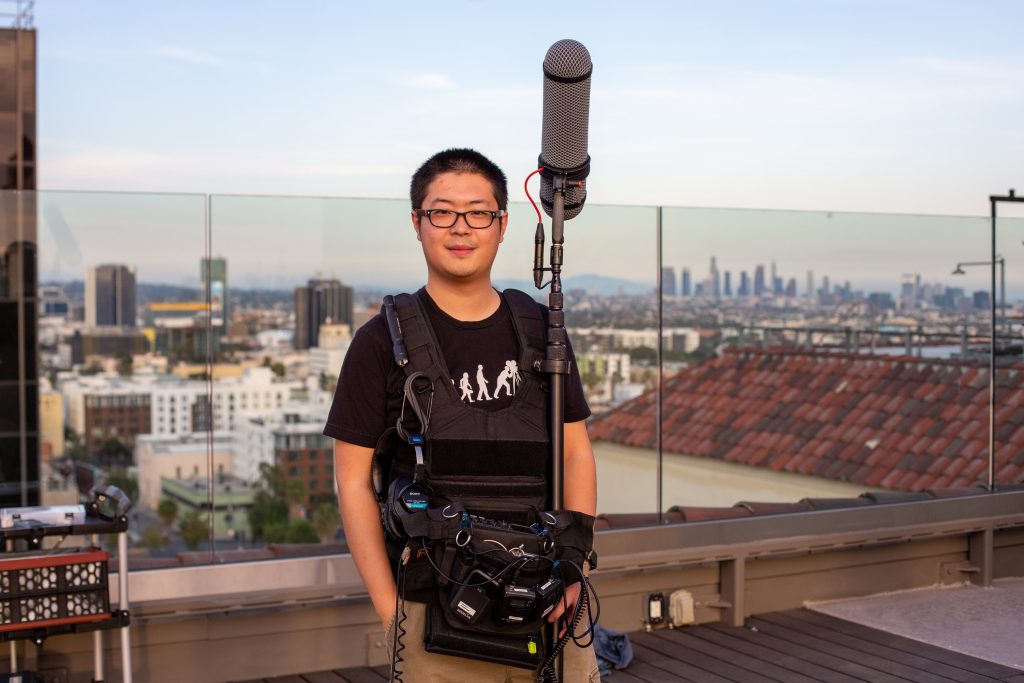
Haoran Li first became interested in sound at just five years old. It was at that age when he began studying the piano. However, he was never interested in making music, he was more fascinated by the technology behind hitting a key and a sound emerges. When his parents bought him a synthesizer, all interest in the piano faded away. Instead, he would experiment with the functions and sounds he could create with the tool.
Fast forward to today, an in-demand sound mixer in his home country of China and abroad, Li looks back at that synthesizer as the moment his passion for sound was born. Of course, as he aged, this passion only intensified, playing around with sound software on the computer at nine, and as a teenager realizing he wanted to use this passion in the field of filmmaking, but that love for sound that began as a child remains to this day.
Throughout his esteemed career, Li has worked on many prolific projects that have allowed him to gain a seasoned reputation in his industry. Films like Neither Here Nor There, Switch, and The Gift of Winter have seen recognition at prestigious international film festivals, and his work has been recognized as a vital aspect of these films’ success.
In 2019, Li was recognized at the Utah Film Awards, where he was nominated for Best Sound Design, and the IndieFEST Film Awards, where he took home the Award of Merit in Sound Editing/Sound Mixing, for his work on the drama Fair Faults.
“This is a film that wants to discuss what it means to have no judgment. I am very happy that this film is liked by many people, as this shows that we have told the story well. I am thankful that in the case of limited production sound files, I tried my best, so the recognition at film festivals feels very rewarding,” he says.
Fair Faults tells the story of a 25-year-old woman and a 60-year-old man who must dare all for the sake of a relationship forbidden by society. “Fair is foul, and foul is fair,” As Macbeth reminds us, the boundary between the “fair” and the “foul” is essentially elusive, as is the boundary between our sympathy and disgust for people who appear to be different from us. To this end, this film is an experiment that explores the boundary of society’s toleration.
“The story is very simple; through the intimate behavior of the two, audiences are also caught in the affirmation of the relationship between this couple. This triggered criticism of making judgments based solely on appearance. For sound design, the sighing sound of the people around them is a kind affirmation of their relationship. I considered this when designing sound and emphasized the sighing sound of others in an attempt to strengthen the audience’s feelings,” says Li.
Li was asked onto the project by Director Robin Wang, as the two had previously worked together on Switch and found great synergy. When Wang had a vision for this new film and needed a sound designer, he knew Li would bring this vision to a reality.
“Haoran worked as my on-set sound recordist and post sound designer. I have my complete and utter trust in his professionalism and creativity in bringing the project to the next level. As a sound mixer, he is completely capable of taking up jobs in feature film/television of any budget/scale,” says Wang.
As the sole sound designer on the film, Li was responsible for all post-production sound, including audio repair, editing, and mixing. Because there are some obvious problems in the original production sound files, Li’s first job was to repair these sounds as much as possible. His second task was sound editing, which involved removing the background noise in the dialogue, and recording and adding sound effects matching the picture, so that those added sounds seemed natural and part of the initial recording. After all this was completed, Li moved onto sound mixing, balancing the sound effects, dialogue, and music to ensure that dialogues are always clear.
“In this project, I spent a lot of time repairing the problematic audio. As a sound editor and mixer, my job responsibilities are the same as when I was a production sound mixer – use any possible technical methods to ensure sound quality. Of course I always hope that the audio file I get is perfect in shape, but as many filmmakers know, this is only a dream. There will be some inevitable problems when recording on set. This requires a sound editor to solve the problem through technical methods. The repair process is slow, but I enjoy it,” he says.
Be sure to check out Fair Faults to hear Li’s award-winning sound, and to see a surprise twist.


Be the first to comment on "There’s no ‘Fair Faults’ for Sound Mixer Haoran Li"